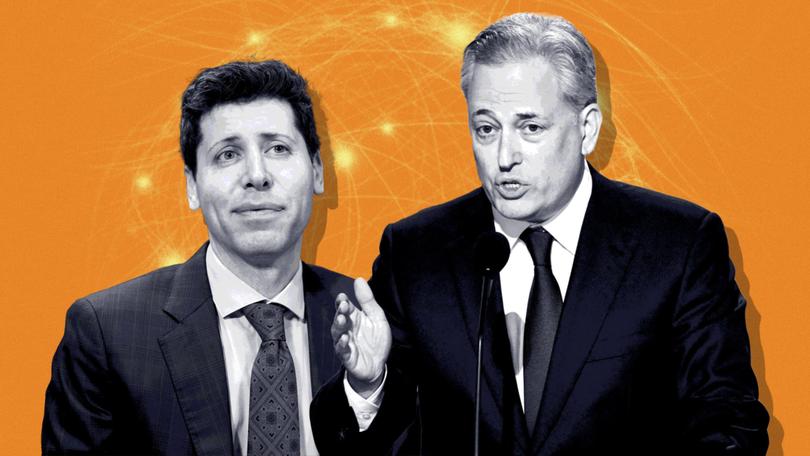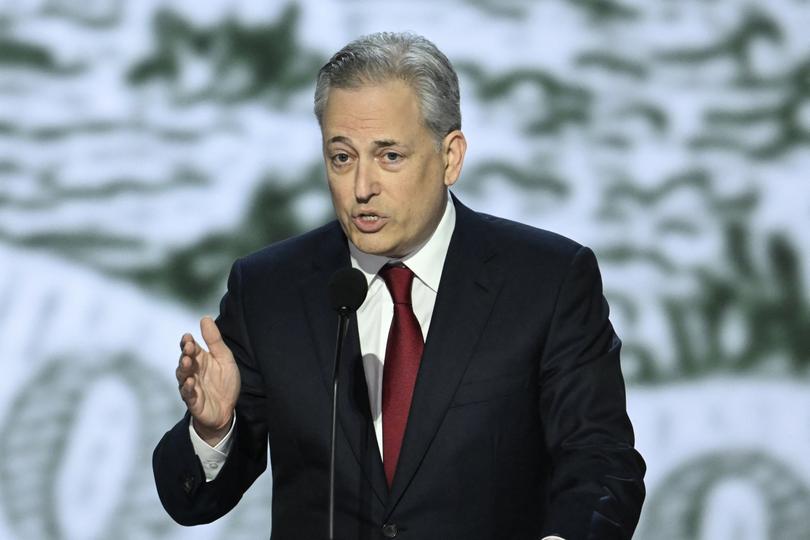Silicon Valley’s unicorn hunters Sam Altman and David Sacks have what it takes to back plenty of winners
They may be on opposite ends of the political spectrum, but Sam Altman and David Sacks are among the best spotters of Silicon Valley’s entrepreneurial talent.

What do Sam Altman and David Sacks have in common? Certainly not politics.
Mr Altman, co-founder of OpenAI, is part of the transition team of Daniel Lurie, the Democratic mayor-elect of San Francisco.
David Sacks, an entrepreneur and polemical right-wing podcaster, will on January 20 become Donald Trump’s crypto and artificial-intelligence tsar.
Sign up to The Nightly's newsletters.
Get the first look at the digital newspaper, curated daily stories and breaking headlines delivered to your inbox.
By continuing you agree to our Terms and Privacy Policy.Yet both have the distinction of being among Silicon Valley’s best spotters of entrepreneurial talent.
According to data from TRAC, a venture-capital firm, few are as good at picking promising startups at the very earliest stage.
Messrs Altman and Sacks stand out because of the whopping number of successful startups they have backed right from the beginning, when most investment tends to come from a founder’s friends and family.
TRAC reckons that 28 per cent of Mr Altman’s 322 early-stage investments have made at least 10 times the original stake, and 27 have become unicorns, with valuations over $1billion.
Mr Sacks’s hit rate is just as good. Of his 92 bets monitored by TRAC, 27 per cent have produced more than 10-fold returns, and 17 have become unicorns.

The two men are among the best of an elite group of 250 or so early-stage investors who, according to TRAC, generate supersized returns.
The list features a number of other well-known names, including Elon Musk, boss of Tesla and SpaceX; Jeff Bezos, founder of Amazon; and Marc Andreessen of Andreessen Horowitz, a venture-capital giant.
Jessica Livingston, co-founder of Y Combinator, a venture firm, is one of the dozen or so female early-stage investors among the 250 (the small number reflects the under-representation of women in Silicon Valley generally).
Though she has made only 13 early-stage investments, 31 per cent of them have made a return of more than ten times.
TRAC’s methodology is novel. Whereas most venture-capital firms use gut instinct and inside knowledge to spot the most promising entrepreneurs, it uses a range of quantitative metrics to identify the most consistent talent scouts instead.
That includes the multiple they return on their investments, assuming their stakes could be liquidated at current values, and the share of their portfolios that do follow-on fundraisings.

If two or more of them back a startup in a field where they have a proven record, that is a strong predictor that the startup will be worth backing, TRAC says. Its modus operandi is to invest alongside them if it can.
At first glance, some of the superstars on TRAC’s list look like one-hit wonders. Sara Deshpande of Maven Ventures, a venture-capital firm, has generated very high returns mostly from a single company, Embark Trucks, a self-driving outfit that later went bust.
But TRAC’s data suggest she has done well in steering many of her startups to the next funding round.
TRAC does not oversell itself. “I’m a nobody in VC,” said Joe Aaron, its co-founder, when first contacted by your correspondent. The firm uses a variety of information sources, but the data are patchy, he admits.
It’s a small fund. One of its early investments, a fintech company called Human Interest, became a unicorn in 2021. But the fund sometimes struggles to make investments owing to competition with better-known firms that are able to write bigger cheques.
The surge of investment into AI may open up new opportunities.
TRAC has already identified two names it believes are worth following, even if they do invest as a pair. They are Nat Friedman and Daniel Gross, two Silicon Valley investors known for their AI expertise.
“I see them in almost every AI company I look up,” says Mr Aaron.
One day their names could be up there with Messrs Altman and Sacks.
